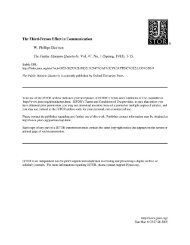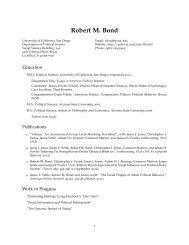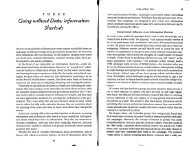Chapter 6 Why Authoritarian Parties? The Regime Party as an ...
Chapter 6 Why Authoritarian Parties? The Regime Party as an ...
Chapter 6 Why Authoritarian Parties? The Regime Party as an ...
Create successful ePaper yourself
Turn your PDF publications into a flip-book with our unique Google optimized e-Paper software.
CHAPTER 6<br />
repression, <strong>an</strong>d maintains political control over appointments. <strong>The</strong> primary role of the latter<br />
two org<strong>an</strong>izationalfeaturesistoenh<strong>an</strong>ce theeffectiveness withwhich hierarchical <strong>as</strong>signment<br />
of service <strong>an</strong>d benefits generates incentives for party members to remain loyal <strong>an</strong>d provide<br />
costly political service. Although the three org<strong>an</strong>izational features could be in principle<br />
administered inisolation, withinseparateinstitutions, theircomplementarity createsbenefits<br />
to their coordination <strong>an</strong>d m<strong>an</strong>agement within a single institution – the regime party.<br />
<strong>Why</strong> do not all dictatorships establish <strong>an</strong>d maintain a regime-s<strong>an</strong>ctioned party? By<br />
examining the political logic that underlies the functioning of authoritari<strong>an</strong> parties, we also<br />
gain insight into the limits of party-b<strong>as</strong>ed cooptation <strong>an</strong>d control. <strong>The</strong> <strong>an</strong>alysis in this<br />
chapter implies that the effective operation of the three org<strong>an</strong>izational features that I have<br />
discussed requires that the regime provide partis<strong>an</strong> access to a large number of political,<br />
economic, <strong>an</strong>d social appointments <strong>an</strong>d thus ch<strong>an</strong>nel signific<strong>an</strong>t resources through the party.<br />
Wemaytherefore expect thatdictatorships whose support b<strong>as</strong>eislimited totraditional elites<br />
– l<strong>an</strong>ded aristocracy or the owners of capital – will not be willing to give up the resources<br />
necessary for the party to effectively perform its cooptation <strong>an</strong>d control functions. <strong>The</strong>se<br />
regimes will find cooptation <strong>an</strong>d control via parties less adv<strong>an</strong>tageous th<strong>an</strong> the alternatives<br />
of repression <strong>an</strong>d cooptation via direct tr<strong>an</strong>sfers. <strong>The</strong> <strong>an</strong>alysis in this chapter thus helps<br />
us underst<strong>an</strong>d why dictatorships in particular structural conditions do not establish regime-<br />
s<strong>an</strong>ctioned parties or maintain parties without the org<strong>an</strong>izational features examined here,<br />
which in turn remain politically inconsequential.<br />
54











